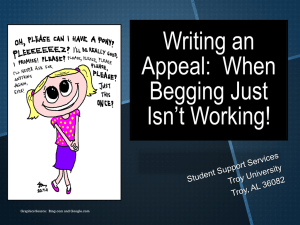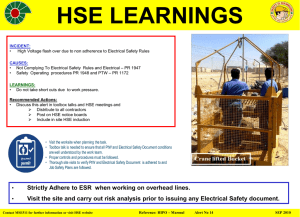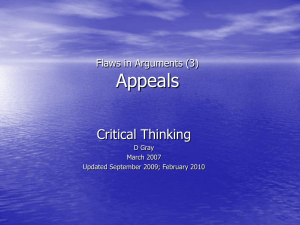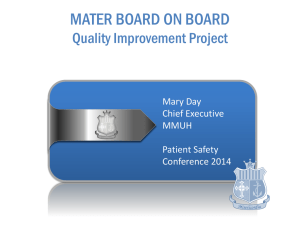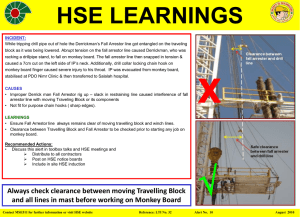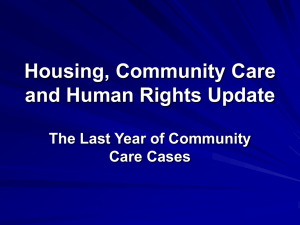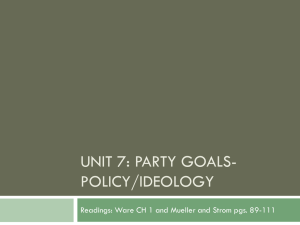Social Welfare Appeals Process & Case Studies
advertisement
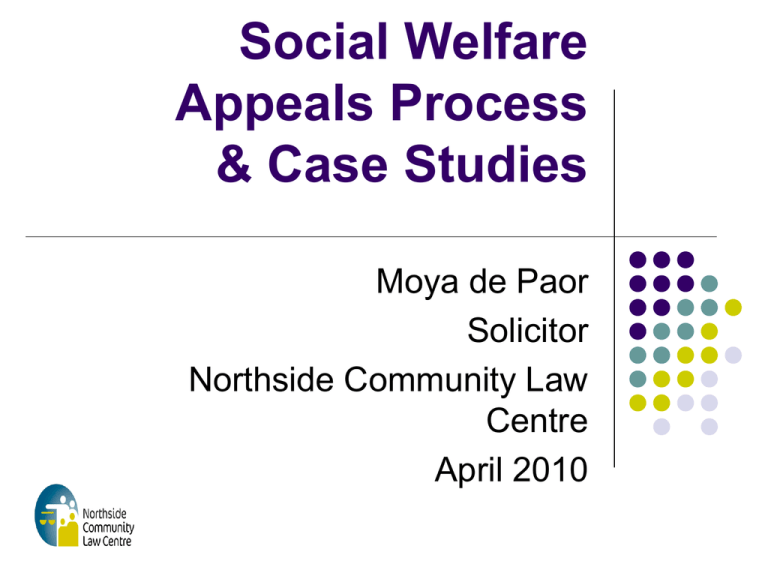
Social Welfare Appeals Process & Case Studies Moya de Paor Solicitor Northside Community Law Centre April 2010 Social Welfare Appeals Office Social Welfare Appeals Office (SWAO) established in 1990 Deals with appeals on all social welfare benefits and allowances including appeals from the HSE on supplementary welfare allowance (SWA) entitlements Staffed by Appeals Officers and headed up by Chief Appeals Officer SWAO is independent of Department of Social Protection (DSP) with separate premises and staff However SWAO is not completely independent as it is under remit of DSP and is staffed by civil servants who are appointed by the Minister (Sc 304 2005 Act) Steps in taking appeal to SWAO Decisions of Deciding Officers can be appealed to SWAO Standard appeal form or letter Time limit of 21 days – can be extended Can request Deciding Officer to revise decision ( 27% of all cases dealt with in 2008 by way of revision ) Appeal sent to Department for comment or clarification can be rectified at this stage if misunderstanding by claimant or new evidence produced If not resolved earlier appeal proceeds – can be dealt with by way of oral hearing or summary decision Steps in taking an appeal If dealt with by summary appeal no oral hearing case decided on basis on papers submitted – 41% of all cases in in 2008 were dealt with by way of summary decision –20% had a successful outcome Request oral hearing in all cases – evidence of client significant factor in obtaining favourable decision – 59% of cases in 2008 dealt with by way of oral hearing – 45% had a successful outcome Before oral hearing request file under Freedom of Information Acts including all medical reports Consider evidence necessary to support case – illness benefit medical evidence letters reports from GP / consultant Steps in taking an appeal Appeal hearing – Appeals Officer hears case de novo can take all matters into account – (AO has power to take evidence on oath and power to require witnesses to attend) Hearings held in private and are informal Department can be represented by an inspector / assessor if claim related to Jobseekers or if appeal from HSE a rep from HSE – more often Department is unrepresented Appeal hearing focuses on reason for refusal of benefit by deciding officer/ examines background info from file opportunity for claimant to put forward their case -any supporting documentation - evidence of relevant witnesses 2008 SWAO received 17,833 appeals increase of 27% on 2007 – huge volume of appeals – compare other quasijudicial bodies such as Employment Appeals Tribunal for 2008 5,457 cases referred – Equality Tribunal – 996 Steps in taking an appeal 2008 – 48% of all cases taken were successful – highlights quality of decision making by Deciding Officers and benefit of appealing all negative decisions Informed by SWAO of outcome generally within 2 months Appeal can be allowed, disallowed with reasons provided why appeal disallowed, or partially allowed If appeal allowed - claim can be backdated when applicant first applied for benefit AO report should be requested sets out detail of hearing and rationale for decision (can rely on SC 18 of FOI Act entitled to seek any findings on any material issues ) Steps in taking an appeal If appeal disallowed decision can be reviewed further under Sc 318 of the 2005 Act by referring case to Chief Appeals Officer who can review decision in respect of whether an AO erred in relation to the law or the facts This is last avenue of appeal/review – appeal on the papers only – nature of appeal/ review and procedure need clarification If negative decision from review under SC 318 can appeal to the High Court by way of application for Judicial Review or appeal on a point of law to the High Court - scope of appeal is limited to procedural issues – High Court no jurisdiction to examine facts of case No provision for legal aid for cases to SWAO under Civil Legal Aid Act Case Study – Rent Supplement – Appeal Process of HSE Supplementary welfare allowance entitlements such as basic SWA, rent supplement and mortgage interest supplement are administered by the HSE through Community Welfare Officers (CWO’s) Decisions of CWO’s can be appealed to the HSE to their Appeals Office there is a specific form or can write appealing decision – not aware of specific time limit Appeal on paper only – no provision for oral hearing – furnish all supporting documentation to Appeals Office Decision of Appeals Officer must set out reasons for disallowing appeal – decision can be appealed to SWAO but must be referred by HSE on foot of notice of appeal being sent to them – questions re impartiality and independence of process when required to send appeal to HSE Case Study – Rent Supplement Rent supplement payment paid to person in private rented accommodation who satisfies means test and is assessed as having a housing need/ is in private rented accommodation and cannot afford to meet costs of such accommodation and satisfies habitual residency test ( basic criteria) Specific criteria governing rent supplement and mortgage interest supplement set out in Social Welfare (Consolidated Supplementary Welfare Allowance) Regulations 2007 SI 412 as amended The rent payable must be reasonable as determined by HSE having regard to family size location of house etc must be within maximum rent limits Case Study – Rent Supplement Case study client of Law Centre had been refused rent supplement on the basis that she had rejected 3 offers of accommodation offered by the local authority Client appealed decision to HSE through Appeals Office and was refused based on Article 9 (2) (f) of the 2007 Regulations (now amended by 2009 Regulations) which states that if refuse 3 offers of accommodation within 18 month period can be refused rent supplement for 12 months Client came to Law Centre in June 2009 who appealed decision to SWAO Client argued that 3 offers made by local authority did not constitute 3 valid offers – offers made in areas where client requested to be removed from the housing list in respect of those areas Case Study – Rent Supplement There were grounds to dispute each offer that was made – specific requests made by client due to family reasons to be removed from original areas of preference – ignored by housing authority – final offer made by authority in area which was never listed by client No representative from HSE present at appeal no new evidence put forward by client Case centred on legal arguments regarding examination of local authorities scheme of letting priorities – interpretation of 2007 Regulations Sc 9 (2) (f) which refers to “an offer of accommodation” which in light of principles of fair procedures and natural justice must imply that offers must be valid and fair Case Study – Rent Supplement Decision to refuse rent supplement in breach of Sc 9 (2) (f) which stipulates that 3 offers must be made with 18 months - as in client’s case spanned 21 months Given gravity of decision prohibited from receiving rent supplement for 12 months and taken off housing list for 2 years client and son would be forced into homeless accommodation very serious consequences – engaged protection under the European Convention and Constitution Decision – Appeal Allowed – on basis that HSE not compliant with Sc 9 (2) (f) as outside time limit – awarded rent supplement and re-instated on housing list Case Study – Mortgage Interest Supplement Mortgage Interest Supplement (MIS) provides an interim measure to help with interest only portion of mortgage – if have consolidated loan will get payment for interest portion only that relates to essential purchase repair or maintenance of your home To obtain MIS you must satisfy - a means test – that you were in a position to repay the loan at the time the loan was taken out – interest that is payable does not exceed an amount that the HSE considers reasonable to meet your residential needs reasonable to award MIS given amount of arrears - are habitual resident in the State – conditions set out in 2007 regulations Case Study – MIS Client refused MIS by HSE on June 08 on the basis that the mortgage interest payable per week is €331.43 was deemed excessive to meet residential needs stated that amount of €175 per week would be reasonable Case appealed to SWAO – argued that the interest represented total interest of 2 consolidated loans – residential loan from 2004 and top up loan 2006 and that was seeking supplement for interest only payable on home loan which would be deemed to be reasonable HSE were represented and attempted to raise issues regarding claimant’s ability to pay home loan in 2004 Case Study – MIS It was argued by the HSE that client was not in a position to repay mortgage payments in 2004 according to financial statements AO allowed appeal on the basis that the 2 loans were distinct and was entitled to MIS on home loan in the amount of €133 per week and backdated to original date of application in May 2008 HSE refused to implement the decision and grant either MIS or backdated payments and instead sought further documents to prove ability to pay at time of loan in 2004 Argued by Law Centre that AO decision is final and conclusive Sc 320 of 2005 Act Case Study- MIS Also argued CWO acting ultra vires their powers in requesting further information and threatened judicial review proceedings CWO awarded MIS and backdated payments Guidelines on the Administration of the Mortgage Interest Supplement (MIS) Scheme June 2009 Discretionary provision under Article 38 of 2007 regulations “Notwithstanding the foregoing articles, the Executive may award a supplement in any case where it appears ….that the circumstances of the case so warrant” Issues for Discussion Independence of SWAO – interests of integrity of system, transparency and to provide confidence to those using system should be removed entirely from the remit of the Department – engage European Convention- Article 6 Independence of Medical Assessors – employed by the Department- cursory medical interview – no specialist expertise –out of 17,833 cases - 8,000 involved illness benefit type claims – recommended review - research 2005 No decisions published by SWAO – no precedents available there are case studies included in annual reports and published on the website not sufficient and in no way remedies the fact that decisions are not published Research of Law Centre “ The Social Welfare Appeals System; Accessible & Fair ?” completed in 2005 called for publication of decisions Currently all claimants operating in vacuum not aware of decisions on same issues – not aware of relevant factors intrinsic to decisions - no indication of consistency or quality of decision making by AO Issues for Discussion Refugee Appeals Tribunal challenged for their failure to publish decisions – Supreme Court decision Atanasov v Refugee Appeals Tribunal & Ors 2006 Court held that the refusal of the RAT to make available to the applicant relevant tribunal decisions was in breach of the applicant’s rights to fair procedures and natural and constitutional justice Relates to the rights of those taking cases in advance of a hearing not a general right to obtain all decisions Relevant precedent for SWAO Casebase operated by Law Centre Issues for Discussion Representation no right to representation Decision to allow claimant representation is at discretion of AO – should be allowed as a right – in practice representation is allowed No provision for legal aid under Legal Aid Act Blanket exclusion may engage European Convention – Article 6 – Access to Court – Airey principles Article 47 of the Charter of Fundamental Rights provides right to legal aid to those who are exercising a community right – Legal aid shall be made available to those who lack sufficient resources in so far as such aid is necessary to ensure effective access to justice
